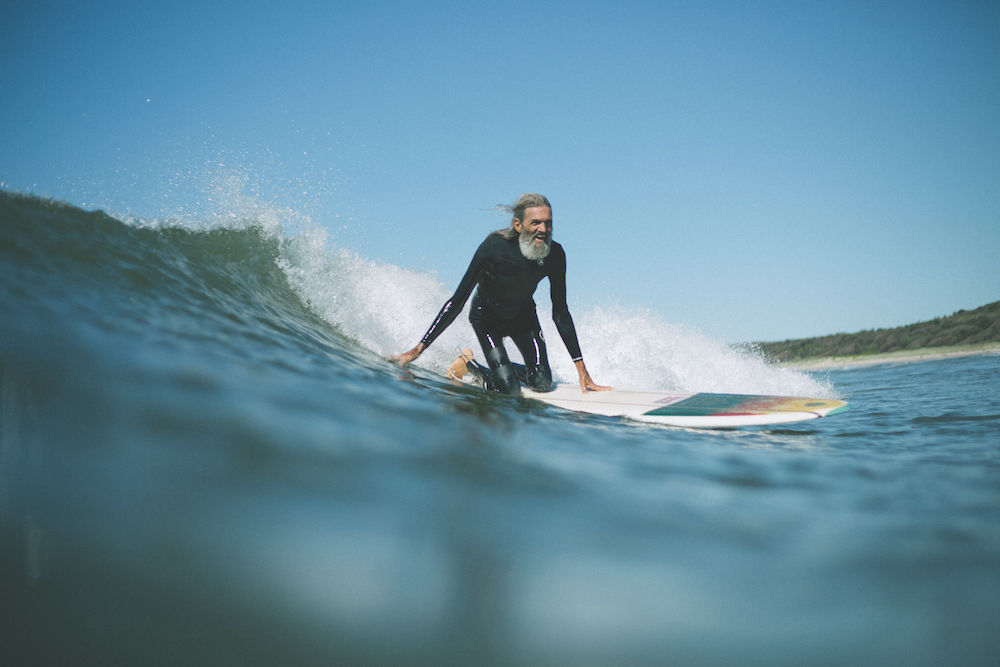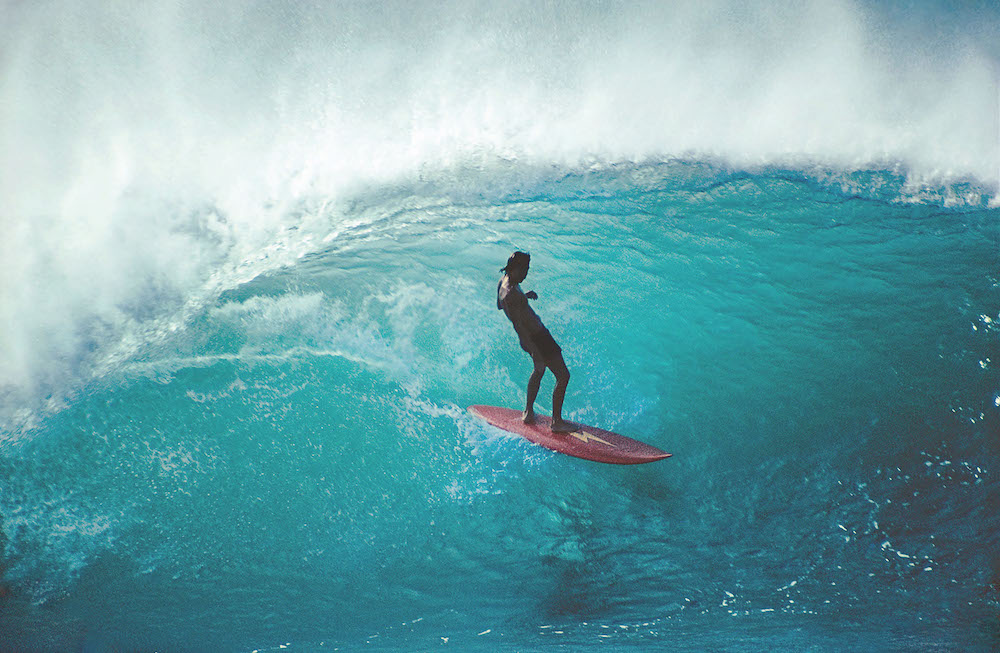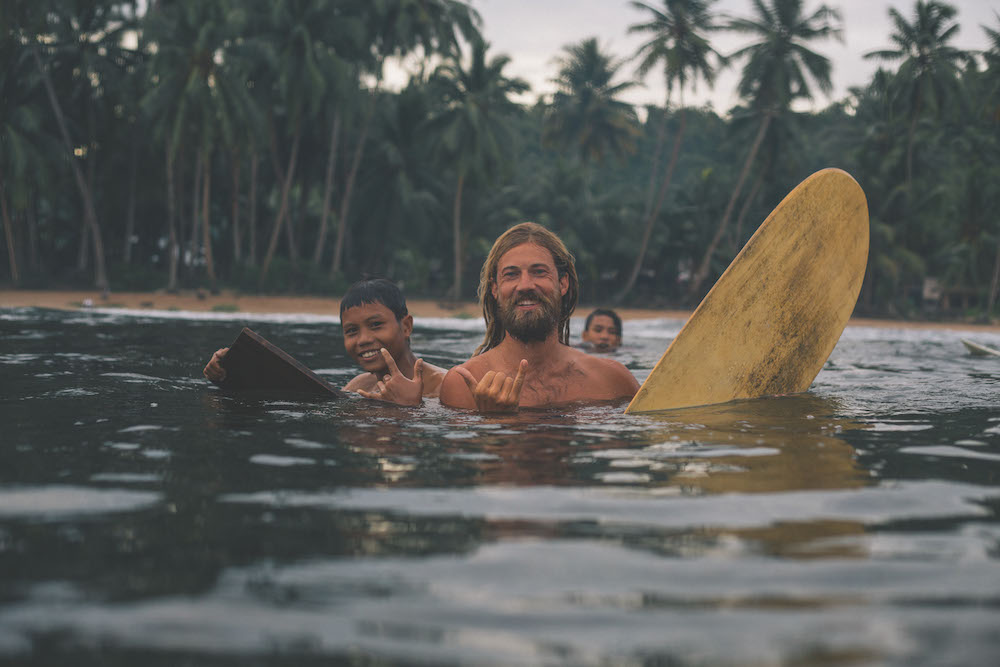LAUREN HILL EXAMINES THE GIFT OF SURFING AND HOW WE CAN CARRY THE POSITIVE ENERGY FORWARDS
This article is lifted from the pages of Wavelength Vol. 263 and is always better in print. You can grab a copy of Vol. 263 here or subscribe for £25 a year, to receive both mags direct to your door along with a bonus freebie of your choice as a thank you for being part of the Wavelength fam.
Words: Lauren Hill
Images: Nathan Oldfield (unless otherwise stated)
From the moment the first little brown body slid into the first rolling shorey, and her little brother ran in to try and out-do her length of ride, surfing has landed in different ways for different people. It’s a playful romp, a competitive arena, community bonding, artful expression. Always changing to meet us where we are, if we let it, like a wall-less, aquatic room of requirement.
A particularly dark period in my own life helped me to more acutely understand what this wave sliding thing means to me; why I keep coming back for one more, one more.
I thought my mom was dying. She’d recently had her leg amputated and infection was threatening to take her life, too. We flew from Australia, with our 10-month-old baby, to be at her hospital bedside in the landlocked, middle of Florida.
My single mama, who worked three jobs to give us a good life. My mom, who not only birthed me from her own body, but then drove me to every surf contest, no matter how far, no matter how many 50+ hour weeks she’d worked in a row. Astounding commitment. I was unsure of who I would be without her as my anchor. It was uncharted territory.
Every few days we’d drag our pasty selves out of the hospital and rush to the coast as a kind of antidepressant. One volcanic middle of the day surf, I found myself finally letting the floodgates open.
‘Mama, mama, MAMA …’ I was screaming into the wind as it turned onshore, into my face. It was a proper heaving sort of cry. Guttural and unrestrained. A rare flavour in adulthood, reserved for grief, I think.

I was feeling the suffering of my biological mom, but also crying out to the ever-present ocean mother who had buoyed me – so many times – when no one else could: The Atlantic. It’s warm, turbid waters just a short walk away for my entire childhood. Not always inviting, but always there.
It’s not that surfing made me smile that day. But the knowing that I could still slide a short way in the sunshine, be in my body, and feel something trimming parallel to the grief and the fear was enough. This perpetual opportunity to be in relationship with the living world. I felt grateful to rest my tears there, to let saltwater meet saltwater. To be a vessel in a cycle larger than my human tumult, was the gift that I needed.
My partner, Dave Rastovich, and I started The Waterpeople Podcast in 2019 to elicit and share stories about the aquatic experiences that shape who we become back on land. To acknowledge the many and varied gifts of a watery life. But we hadn’t really considered our responsibility to those gifts.
Before launching our fourth season in June 2022, we’d both been reading the great Dr. Robin Wall Kimmerer’s book Braiding Sweetgrass:
‘From the viewpoint of a private property economy the “gift” is deemed to be “free” because we obtain it free of charge, at no cost. But in the gift economy, gifts are not free. The essence of the gift is that it creates a set of relationships. The currency of a gift economy is, at its root, reciprocity. In Western thinking, private land is understood to be a “bundle of rights,” whereas in a gift economy property has a “bundle of responsibilities” attached.’
Dave had circled this passage. I dogeared the page. Two questions were seeded in us both:
If we think of a wave as a gift, then what does that make us? Lucky? Sure. Gluttonous? Definitely sometimes.

It’s tempting to think of us as giftees, but the wave isn’t expressly for us in any way. We just happen to line ourselves up in the right position; a seagull catching a free ride.
What are our ‘bundle of responsibilities’ as the recipients of these wave-gifts? How are we living in reciprocity?
In exploring these questions, we recalled past episodes where our guests had also reflected on surfing in terms of a gift. In 2020, I asked Gerry Lopez about his experience of growing up as an ethnic minority in Hawai’i, and for his reflections on racism in the US. He took the macro-perspective of the elder that he is:
‘I think our purpose here on Earth, in this lifetime, is to discover our higher mind. Become aware of it and eventually learn to use it. And not get sucked into our lower mind — which is the anger, the hate, the anxiety. All those terrible things we are seeing being played out right now. And this is difficult.
As surfers, we are given a very, very special gift that is very similar to a yoga practice. And we need to spread the wisdom that this gift has allowed us to gain that.’
Californian Cher Pendarvis, one of the first surfers to ride the ‘fish,’ once told me about a conversation she’d had with her dear friend Rell Sunn, Queen of Makaha, who said ‘a wave is energy made visible and we ride that energy. We respect that energy and we connect with that energy all the way till it falls on the sand, with gratitude.’ Cher encouraged me to ‘think about where that wave comes from the next time you paddle for a wave and are gifted to catch it. Because surfing really is a gift, and every wave is precious.’
Surfing is often characterised in terms of being ‘Hawai’i’s gift to the world,’ but we know that surfing wasn’t really gifted to the world. It was extracted from Polynesia. Like the broader cultures from which it emerged, modern surf culture has mostly been about taking the gifts. We can all relate to the over-froth those early Europeans, and later, Americans, must have experienced — the wild, spontaneous departure from their terrestrial lives.
And we can also imagine the Hawaiian surfers who must have rolled their eyes at the hastey, pasty ones who just didn’t get it. Didn’t take the time to understand that there was so much more to he’e nalu than just the solo, standing up bit. And that’s what we’ve come mostly to laud: the individualised performance.

Surfing was of such value to early Hawaiians that it was forbidden to work or war during prime surf season – everyone took a full three months off over winter for social bonding via play and playful competition — The Makahiki Festival. The ecological abundance of the Hawaiian Islands meant food was easily accessed, and so leisure was also abundant.
Makahiki was a time of growing, gaming, but also, of giving. Ho‘okupu (offerings or symbolic gifts) were given by maka‘āinana (citizenry) to their ali‘i (chief) and akua (gods).
‘It was believed that this annual practice of giving, an integral phase of the harvest season’s ceremonies, would encourage the continued growth and fertility of our lands and resources,’ as described by Hawaiian culture keeper Kapalai‘ula de Silva.
Like community and competition, reciprocity is also entwined with the roots of surfing.
We recently posed the question of how we might gratefully accept the ‘bundle of responsibilities’ of the gift of surfing, both personally and culturally, to master shaper Tom Wegener. It turns out that much of his work as a board-builder, Ph.D and now politician, has been in pursuit of giving back to surfing in ways that feel equivalent to what he has been gifted:
‘I write in the book [Surfboard Artisans: For The Love] that the surfboard shaper, as an artisan, has a place in society where they need to pass the culture on to the next generation. And if the culture is not passed on, then it’s just lost. And I was concerned. The culture I got was phenomenal. There’s so much to it. And I got that from Donald Takayama and from the elders. Watching how Donald treated people.

Right: Dave Rastovich filling up on a wave energy ready to share it on land.
Making surfboards and giving surfboards away was just a part of the worldview or modus operandi of the way they operate in society. The way they deal with people. And I think that is a gift that he gives to us and we do have to pass it on.
We’ve seen how quickly extractive practices have failed us. And we need regenerative practice. Just as you appreciate surfing, I think you need to be regenerative about the stories and the culture. That is what makes surfing as great as it is.’
‘How joyous is a flower opening its face to the sun? How stoked is a surfer running toward the sea?’, this was Dave’s initial response to my overly-heady questions about the meaning-making of the gift. He’s best at bringing it back to the simple.
So maybe surfing is a way that we can approximate photosynthesis: transforming wave energy into the buzz of the post-surf. If energy can be neither created nor destroyed, surely some of that breaking wave energy travels through us, too?
What we do with that energy is our choice, but also our charge, our opportunity.
Maybe we reciprocate the gift by showing up as a more patient parent, a more present partner, or as a carer for loved ones when they need us most. Surfing refilled me when I needed to direct my own energy fully elsewhere.
If we interpret “gift” in the spirit that I think Robin Wall Kimmerer meant it, as more than just material, then any good and kind act can be our way of passing it on.
So we’re playing with the question of how we can accept our reasonability to surfing this season on Waterpeople. Like any good question, it raises many more.

What makes up the bones of the gifts of surfing?
For me, it’s a sense of belonging. My Jewish ancestors braved the Atlantic for the possibility of safety on another continent. My mom fled from the coal-laced Pennsylvanian dirt of her childhood when she was 18, heading south on a motorcycle (or so the story goes). I moved to Australia when I was 24. I could not live any further from where I grew up.
For many of us who live far from our people, or don’t know who our people at all, surfing gifts us family and a sense of belonging. Surfing was extracted, but it’s not too late to acknowledge and respect the surfers who came before us; to honour their wisdom and do right by the traditions they laid. Indigeneity, as Hawaiian surfer and scientist Dt. Cliff Kapono told us a couple of seasons ago, is ultimately defined by belonging to place. And respect for story.
I’m not saying that we should continue to borrow, steal or extract from native culture (even though I often wonder if the ancient Hawaiians hit the peak of human civilisation — at least for surfers).
How do we craft a more regenerative way of relating to riding waves together? How do we shift toward a more respectful, life-supporting culture?
Dave and I both feel a responsibility to have these conversations, even if we never come up with a good answer. But the folks we get to chat with almost always do.

This article is lifted from the pages of Wavelength Vol. 263 and is always better in print. You can grab a copy of Vol. 263 here or subscribe for £25 a year, to receive both mags direct to your door along with a bonus freebie of your choice as a thank you for being part of the Wavelength fam.
